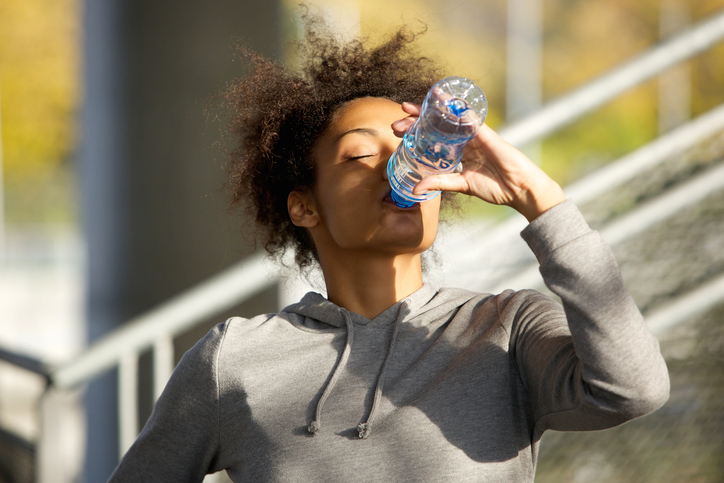Hydration
Summertime often includes having ‘fun in the sun’ and/or traveling. Although good for our mental health, these activities can often affect the amount of water consumption in our daily routine. Staying hydrated is important for physiological functions, and maintaining a proper balance between water and electrolytes in our bodies determines how most our systems function, including nerves and muscles (e.g. regulating blood pressure).
Facts:
- Water makes up about 60% of your body weight!
- Water is lost though everyday activities, such as digestion, breathing, and perspiration (especially during exercise).
- Without sufficient water in your body, your cells get congested, your body can’t detox, and your bladder and kidneys won’t work properly.
- Water in your body produces necessary body fluids, such as saliva and tears, and removes waste from your body through sweat, urination, and stool.
- Water helps regulate your body temperature (avoid heatstroke), keeps skin moisturized, and lubricates your joints.
- Being properly hydrated can improve mood, boost brain function, and prevent fatigue.
Signs You Are Dehydrated:
Adults:
- Headache
- Decrease in coordination
- Lack of energy
- Nausea
- Muscle cramps
- Dizziness
- Thirst
- Dry Mouth
- Dry Skin
- Dark-colored urine
- Constipation
- Crankiness
Infants:
- Fever
- Unusual tiredness
- No tears
- Dry mouth
- No wet Diapers (for 3 hours or longer)
Did you know? It is common to believe you are properly hydrated if you are not thirsty, however that may not always be the best indicator. According to the American Council on Exercise, once you are experiencing thirst, your body may already be dehydrated.
Listening to your body and recognizing early signs of inadequate hydration and replacing lost fluids can help prevent dehydration.
How to stay hydrated:
- Drink more water! How much? Below are recommendations.
- Start and finish your day with 8-16oz of water.
- Include a sports drink with prolonged or intense exercise.
- Avoid alcohol, sugary sodas, and juices.
- Eat water-rich foods, such as fresh veggies and whole fruits.
- Limit caffeine, such as coffee. As a diarrheic, it can contribute to dehydration.
Recommended H2O Consumption:
Adults:
For men, the Institute of Medicine (IOM) recommends a total of 13 cups (about 3 liters) of fluid each day. For women, they suggest 9 cups (a little over 2 liters) of fluid each day. Pregnant women should drink about 10 cups of water daily. Those who breastfeed need about 12 cups.
If you’re outside on a hot day, or doing something that makes you sweat a lot, you’ll need to drink more fluids to stay hydrated. The same is true if you have an illness that causes you to vomit, have diarrhea, or run a fever.
However, if you have a condition like heart failure or a particular type of kidney disease, you may need to limit your fluid intake. Talk to your doctor about what’s right for you.
Children:
Like adults, how much water children need depends on many things, like their age, how much they weigh, and their sex. Other things that play a role include how healthy and active they are, and what the climate is like where they live. Minimum suggestion is 6-8 cups per day, depending on the above circumstances.
When to Consume H2O:
- Before exercise, it is essential to be well hydrated. According to the University of Illinois, you should drink about 8-16oz of water about two hours before starting exercise.
- During exercise replenish fluids by drinking about 6oz of water every fifteen minutes… Keep in mind, you may not always feel thirsty during exercise, but it is still important to drink water throughout your workout.
- After you have stopped exercising, you still need to replace the fluids you lost. The American Council on Exercise recommends drinking between 16 and 24oz of water for every pound of weight lost through sweating during exercise.
Although uncommon, it is possible to ‘over-consume’ water, affecting the balance of water and electrolytes/sodium in the body. This is known as hyponatremia (water intoxication), and occurs mostly in people who are exercising for extended period of time where the salt in the body decreases to abnormally low levels. Although a serious condition, poor hydration during exercise is much more common than over-hydration.
Sport drinks and Pedialyte contain electrolytes, such as potassium and sodium, which are lost through sweat and is a good addiction to water during intense or prolonged exercise.
Try These to Help Increase H2O Consumption:
- Carry re-usable BPA-Free H2O bottles – common trusted brands listed below:
-
- Kleen Kanteen
- Hydroflask
- Nalgene
(I prefer 32-40oz insulated stainless-steel to keep water cold)
- Use Fitbit or a health app featuring reminders for water consumption
- Set a timer to have a glass every hour at work (8oz x 8 hours) to hit the general recommendation.
- Get a water filtration system for easy access to quality water
- Wean off sugary drinks by adding fresh citrus or fruit to your water
- Grab an all-natural, unsweetened carbonated water and stop drinking soda!
Just remember, if you are out in the sun, exerting energy though vigorous exercise, or dealing with an illness (especially with symptoms of diarrhea and/or vomiting), dehydration is likely. Be prepared for those summer adventures by bringing plenty of water. Continue your healthy, hydrated lifestyle with a nice glass of ‘high quality H2O’ to avoid any of the above signs or symptoms of dehydration.
Author:
Corey McLeod, Strive Health and Rehabilitation
7/22/2018
References:






